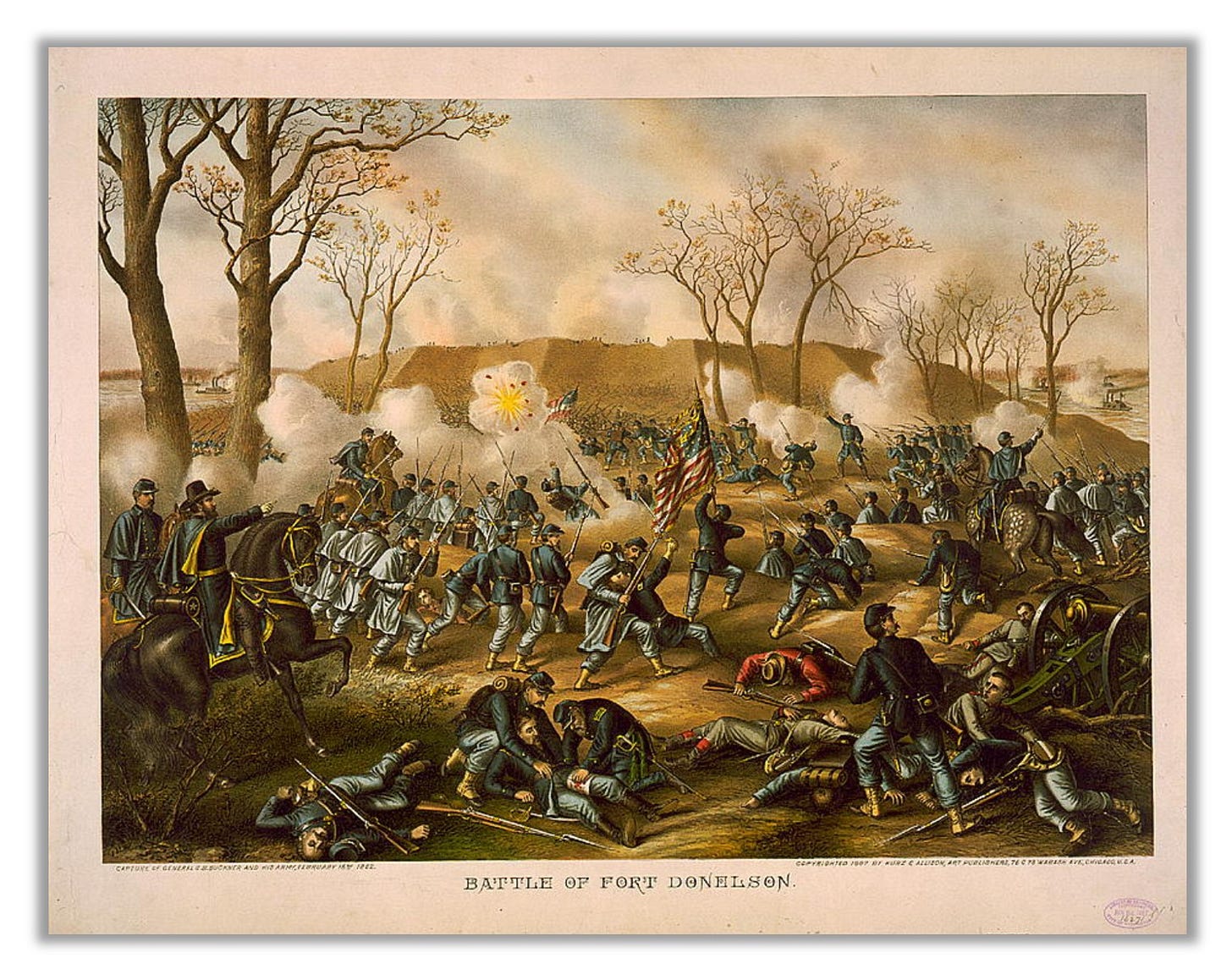TDIH: Battle of Fort Donelson
The victory boosted the reputation of then-Brigadier General Ulysses S. Grant.
On this day in 1862, Confederate forces attempt to break out of Fort Donelson. The effort did not succeed; instead, the Union victory that followed would boost the reputation of then-Brigadier General Ulysses S. Grant, who led the Union effort.
It was then early in the Civil War, and the Confederacy was working to establish three forts near the Kentucky-Tennessee border. These forts were intended to protect several nearby rivers from being used by Union forces. The Union Army wanted to take these forts, of course. Grant proposed an attack on the area and was put in charge of the effort. He wanted to act quickly, before the forts could be completed and fully manned.
The first of these, Forts Henry and Heiman, fell relatively easily on February 6.
The third fort, Fort Donelson, was already protected by about 5,000 men, and it was a tougher prospect. Nevertheless, Grant declared that Donelson would be his by February 8.
Perhaps he was a bit too optimistic?
Harsh weather set in and an attack was delayed, ultimately giving both sides time to obtain more reinforcements: 12,000 new Confederate forces were dispatched to Fort Donelson. In the meantime, Grant’s ranks would swell to 25,000 Union soldiers. By February 14, he had also received reinforcements in the form of four Union ironclads and two wooden gunboats.
These vessels clashed with Confederate water batteries on February 14. Despite their disadvantage, the Confederate forces were doing well. The ironclads had moved in too close and the Confederate batteries took advantage of the mistake. Ultimately, the Union boats were crippled and forced back. They still blocked the river, but the damage they could have inflicted had been minimized.
It was a huge blow to Union morale. Grant dug in for a siege, little knowing what Confederate commanders were planning next.
Indeed, the Confederate forces took advantage of nightfall to make a risky move. They got ready for an early morning assault, using the winter weather to hide their preparations. The plan was to attack the Union right at dawn, hoping to break through and make their escape.
It worked! Or, at least, it should have worked.
Confederate forces broke through the Union line, but then (oddly) they were ordered back to the fort. Grant saw an opportunity, and he took it. His men retook the ground that had just been abandoned by Confederate forces. By the morning of the 16th, some Confederates had escaped, but those who remained behind knew that surrender was the only option.
Simon Buckner had been left in command of the remaining Confederate forces. He and Grant were old friends from West Point, and he’d even helped Grant out of a financial scrape in 1854. He had to have been completely unprepared for Grant’s “ungenerous and unchivalrous” response when he indicated his willingness to discuss surrender terms.
The Union commander’s statement was simple—and harsh: “No terms except an unconditional and immediate surrender can be accepted. I propose to move immediately on your works.”
The demand for unconditional surrender surely set a new tone for the remaining years of the Civil War.
Sources can always be found on my website, here.



Hi, everyone -- Thanks for all your notes. Yes, of course I meant 1862, not 1962. UGHH. I'd actually intended a different story for this morning, but it was taking too long. I decided I needed more time to get it right. Ironic, I guess, because then I grabbed this old story, which had originally been written for a different date, and messed that one up!!! 😆😂 (I had to rewrite the first paragraph to match the new anniversary, but then glitched on the date.) My bad. It's fixed now.
Grant's name was Ulysses Hiram Grant. When he was nominated to go to West Point there was a mistake in his name but told that his nomination name was Ulysses S. Grant and therefore that became his name and was stuck with him. All his WestPoint classmates including James Longstreet called him "Sam" his nickname in reference to his name U. S. Grant. After Fort Donelson was captured, he became "Unconditional Surrender Grant". People admired him with his photos chewing on a cigar that sent him barrels of cigars after that victory. Unfortunately for Grant, he had a boss "Henry Halleck" that was very much jealous of Grant's success. Even though he was successful beating the army of the Tennessee on the 2nd day during the battle of Shilo, he was sacked as a commander due to his boss's spreading rumors that he was drunk. The only person that came to his help was President Lincoln. It has been said that Lincoln indicated that "I can't spare this man! He fights". We also know now what constant smoking of tobacco does to one's health. He was diagnosed with cancer of throat and died at the age of 63. I personally have visited his grave in New York. Recommend it to everyone when in New York city. According to Shelby Foote He was the coolest general under fire.